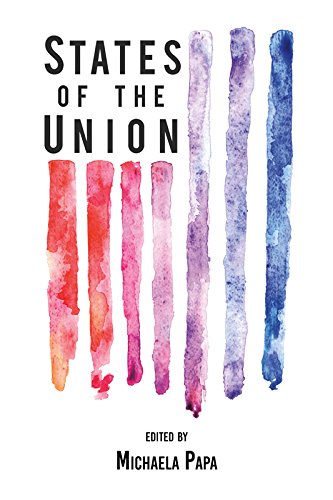
A software engineer in Illinois, who called her parents weeping as Hillary Clinton lost the 2016 election. A college student in New Hampshire who wanted to hear from the other side of the political aisle. A smiling, hatted Vermin Supreme, who didn’t believe despair was the answer.
A 66-year-old mom who voted for Trump, because “I think he’ll get things done.” Or an East Coast elite, imagining a Tinder date with Donald Trump.
Traversing the political spectrum, these characters appear in States of the Union, a new anthology compiled and edited by New Haven teacher and writer Michaela Papa. On Friday evening, Papa will give a reading and book signing at the Yale University Bookstore.
The idea for States of the Union was born in 2016, as Papa was registering voters in North Carolina. Her work gave her a chance to speak with people across political lines, most of whom rarely seemed to cross paths with each other. So she began asking their opinions, hearing loud support for both candidates, and for some that were no longer on the ballot.
Part of her had assumed that those discussions would end with the 2016 presidential election, in which pollsters had predicted a decisive win for Hillary Clinton. Then the election happened, states turning purple and red as the country watched their television screens and refreshed their internet pages, and “everybody had more things to say.”
“I started to write,” she recalled in an interview earlier this year. “Everybody had something to say and it was just a lot of noise. I wanted a place to house how people were processing.”
A lifelong writer with a Master’s degree in creative writing from Emerson College, she began thinking about how to spin the tricks of her trade into something more than an essay, or long-form piece for a newspaper or magazine. She realized that what she was looking for was a book—not in her voice, but in the hundreds that she was hearing around her, and the hundreds more that they were hearing around them.
So a few months out from the election, she opened submissions for a compilation, putting the word out for what she then called a “collection of election reflections.” The call revolved around a single question, she said: “How do you feel about the outcome of this election?” She tried different avenues to get the word out: Facebook, Twitter, Reddit, word of mouth and writers groups. And then she hoped that people would answer.
She didn’t have long to wait. Letters, poetry, fiction, photographs, and short personal essays started pouring in from around the country, personal and sometimes polemic. When she noticed that “a lot of submissions were leaning left,” she looked harder to find conservatives who would submit, beginning to conduct some interviews herself.
“I interviewed everybody who said they wanted to be interviewed,” she recalled. “People I had never met. Friends of friends. Everybody had an uncle who voted for Trump. And at the end of interviews, people would thank me. I would listen, and I think they weren’t used to that.”
By the end of the submission cycle, there were hundreds of entries to go through. She had friends to help her in the process. First, an outside party went through and “scrubbed” submissions, taking names and identifying details off of each of them. Then Papa enlisted a team of editors—“a couple of friends from grad school and my mom” (the latter of whom is an English teacher)—to do a blind review.
“We took into consideration that not everybody was a writer,” she said. “We were interested in how people said what they said. People were really excited to share [their stories].”
In the end, the team went with almost 100 pieces, many of them interviews Papa had done with voters across the country, on both sides of the political aisle. There was Rod Webber, progenitor of Project Love, who rose to prominence as he handed out flowers to candidates in 2016. Pennsylvanian Amy N., whose soft and even voice struck Papa before her political views ever did. Colorado transplant Joseph B., who abstained from voting when he saw it get too nasty.
“The book is nonpartisan itself in that it houses every point,” Papa said. When the team was ready to publish, they raised funds via a Kickstarter.
She has her favorites: an interview with Vermin Supreme that she did not expect to land, that she called “a real thrill to me.” An “editor’s choice” contest winner from an older voter, explaining how a field trip in her third-grade Catechism class had influenced her political outlook. The words from her editors, who she got to know more closely as the book came to fruition.
That mission resonates from the introduction on, her sort of welcome to the book joining words from fellow editors Ryan Bradley, David Braga, and Michele Stulga.
“My hope is that this book is for everybody,” she writes. “That any person who picks it up not only will see themselves reflected in the pages … but will also see strangers, will hear people with different beliefs, backgrounds, ballots.”